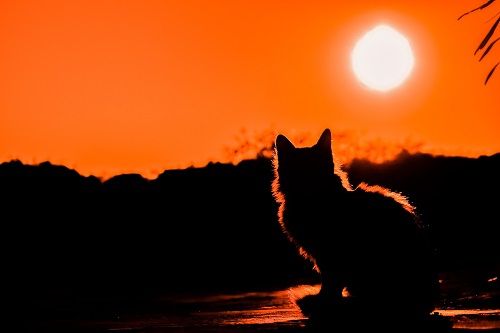
pixabay photo
By
Hope Njoku
Joe is my best friend. But my elder brother, Obika, does not call him by the name Joe; he prefers to just refer to him as the cat. He hates cats the same way he dislikes the smell of the outside toilet. My mother bought Joe at the market because she liked his eyes. I like his eyes too, but I fell in love with him because of his skin. He has very soft fur. The hair on his head was brown, while his skin was peppered with black and white. The day my mother brought him home, I carried him in my bosom and sang gaily in Ibo. Innocence was glaring in the way he flipped his eye lid and meowed. He smelled of nzu, so I scrubbed and scrubbed his skin with toilet soap until he smelled like lavender.
I live with my mother and elder brother in a small house, in a backcountry in Abakaliki. My father died seven years ago because he was over drinking ogogoro, when I was just four and my brother, seven. Because we lived without a father, Obika grew up to become cantankerously untoward. He would go to other people’s farms and steal cocoyam and corn, and then he would roast them in the backyard, on our firewood; the same firewood that he would refuse to come with us to gather. Whenever my mother said: ‘come let us fetch firewood for tomorrow and the day after,’ he would wince as if the outside toilet was beginning to smell. Then he would scratch his head and weakly murmur: ‘I have headache and my foot hurts.’
The very day my mother promised to buy me a cat, I had helped her to harvest ripe ube, pear, which she sells at the market. She smiled and held on to my arms gently.
‘Tell me anything you want,’ she said, ‘and I would buy it.’
I was quiet. My friend, Ike, had a cat but he would not let me play with her.
“I want a cat,’ I said quickly, and my mother nodded with a grin that made her look like a Cheshire cat. She got me the cat the following day.
I would take Joe wherever I went. Sometimes, he trod behind me, halting every now and then to eat ground beetles or crickets. At other times, I would carry him on my shoulder. He was smart and strong. Many times he had chased after shrews and rabbits, and succeeded in bringing them firmly gripped in his teeth to me. We would sit on a stone in the bush and roast them across sticks of fire until their teeth clashed in glaring brownish white. He ate the head, legs, tail, and intestine. I ate the rest.
But he wasn’t just helping me, I also helped him too. Once when he went missing, I searched and searched for several hours until I found him in the backyard. Someone had tied his leg to a heavy water pot. He told me with his eyes that he had been crying for hours, and I said sorry that I did not hear his meows. I tenderly massaged his head and carried him to the house. I asked him who had tied him, but he couldn’t speak. He made his eyes, but I couldn’t particularly understand.
Later, Obika returned home glowering at me and choking in his saliva, and saying that the cat had eaten the best parts of the squirrel he had kept to roast at the backyard. I frowned and murmured a dispassionate sorry.
I took Joe to Ike, my friend, and he was jealous that my cat was more beautiful than his. His cat was ferocious-looking, with long dirty claws.
‘My cat is stronger than yours,’ Ike said.
‘Mine is stronger,’ I contested.
Ike released his cat suddenly and she attacked Joe.
Joe was smaller but quite smart. He could jump really high. They struggled and struggled until Joe maneuvered and pounced on the female cat. The cat cried, and Ike begged me to take my cat away. I laughed without control as I carried Joe home.
One day, I returned home from fetching firewood only to see Obika sitting outside on our old bench. It was unusual to find him at home sitting on the bench. He was known all over the village as a walkabout teenager. An animal was lying lifeless at his feet. My heart skipped because it had the colour of Joe. I threw down the firewood on my head and went closer. Lo and behold, it was my beloved cat.
‘He ate my rabbit again,’ Obika said. “I struck him with stick.’
‘You killed him,’ I shouted.
‘I did not know he would die.’
He stood up and went to bring a stick.
‘This is what I hit him with. I did not even hit him with all my power. The cat is weak.’
I ignored Obika and carried Joe, and I saw the wound on his head. Obika meant to kill him. He never liked him. The wound on the head was clear evidence that Obika struck him with all his might. I cried and cried until my mother returned from the market. But all she could do was promise me another cat. I did not stop crying because no other cat can be as beautiful, strong and smart as Joe. My face became swollen and tears finished from my eyes. When we ate supper, Obika sat on a mat outside and ate as if he had not done anything painful. He never said sorry.
I buried Joe the following day at the backyard. Then I wrote R.I.P., the same thing that was written on my father’s grave, on a wood and stuck it in Joe’s grave. Obika saw it and laughed and called me cat boy.
On this particular evening, my mother had shared our food, but Obika had not returned from his usual outings. I crept to the outside kitchen where his food was kept and added something in it. He came back and I brought the food to him.
‘Thank you cat boy,’ he said and grinned.
I sat on our bench, striking at mosquitoes as I watched him.
It was pounded yam with ofe nsala, his favourite. He had not swallowed up to four balls when I noticed his strange movement. First he touched his belly, then he gripped his neck, and then a loud groan was forced out of his throat. He lay on the ground and began to roll and send out loud cries like someone who wanted to vomit. My mother appeared suddenly from inside the house.
‘Kedu ihe obu,’ she screamed.
She sat on the ground and placed his head on her lap, and was crying.
‘I put rat poison in his food,’ I said.
‘What!’
Quickly, she ran back into the house and came out with a small keg of palm oil. She stuck the mouth of the keg in Obika’s mouth and poured. Minutes later, he was panting and sweating. Then he started shouting that it was the pounded yam that the food tasted like kerosene. I blinked several times until tears began to roll down my cheek. I almost killed him. Mother called me all manner of names thereafter. She said I was a demon, and that I was sent from the underworld. I wept until she understood that I was not evil, that Obika had intentionally killed my beloved cat and he never said sorry.
Obika recovered quickly and I was expecting he would kill me just as he killed Joe. But he did not.
‘I saw only white-white clouds,’ he said using his hand to describe before my mother. ‘And breeze was blowing, and my eye was turning.’
‘I thank God you did not die,’ my mother said raising her hand toward heaven.
I was quiet throughout their conversation. I did not think Obika’s near-death was right. But it turned out a blessing in disguise as he followed me to fetch fire wood the following day.
Hope Njoku
Hope Njoku is a prize winning writer who believes one of God’s greatest gift to man is that of storytelling. He was longlisted in the Brilliant flash fiction international contest and the Blackletter Media short story contest. Some of his works have appeared online including on Inigeria, Crater Library anthology, Electronic Pamphlet, and The Kalahari Review. His young adult fiction, ‘I Do Not Have A Father’, is forthcoming soon.


Beautiful read